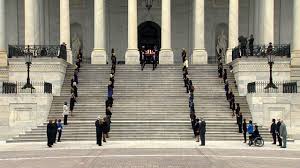Abortion stirs GOP tensions in Supreme Court fight
Two rising GOP stars with White House aspirations are making the landmark abortion rights decision Roe v. Wade central to the approaching confirmation battle over the Supreme Court, worrying other Republicans with their eyes on November.
Sen. Josh Hawley (R-Mo.) wants to see explicit evidence that any nominee to succeed Justice Ruth Bader Ginsburg views Roe v. Wade as wrongly decided, while Sen. Tom Cotton (R-Ark.) has said the landmark decision must go.
It’s an uncomfortable subject for other Republicans, who would prefer to talk about the nominee’s judicial temperament in more general terms. These senators fear an explicit criticism of Roe v. Wade could prompt a political backlash in the elections less than two months away. The different views are becoming a source of tension as Senate Republicans gear up for a high-profile confirmation battle with the highest of political stakes.
Some Say Nominees Should State Their Position on Roe v. Wade
Hawley, a member of the Senate Judiciary Committee, a Yale Law grad and the former attorney general of Missouri, says President Trump’s nominee should explicitly state her views about the controversial 1973 ruling that establishes the right to an abortion. “I want to see a nominee where there’s some evidence on the record that she understands the significance of Roe and there’s some evidence to indicate that she acknowledges that Roe was wrongly decided, that it’s been bad for the courts,” Hawley said.
Trump has said he will pick a woman to replace Ginsburg and that a decision will be announced Saturday.
Hawley says he’s not asking the nominee for a pledge to overturn Roe v. Wade, but is instead “making an inquiry into basic judicial philosophy.” “The era of the stealth nominee should be over,” he said, adding that a nominee’s views on Roe v. Wade is a “window into a judge’s judicial philosophy.” Hawley said his first question will be, “Has this nominee recognized that Roe v. Wade was wrongly decided in 1973?” Hawley announced his position to colleagues in a floor speech in July, when few lawmakers were expecting a confirmation battle anytime soon.
Cotton, a Harvard Law grad and an influential conservative within the Senate GOP conference, has been outspoken in calling for the high court to revisit the controversial abortion rights decision. “It’s time for Roe v. Wade to go,” Cotton tweeted earlier this month after Trump named the Arkansas senator on his list of 20 potential Supreme Court nominees. Cotton doubled down on his criticism of the landmark case Sunday. “My views on Roe are well known and they are long-standing,” he told Chris Wallace on “Fox News Sunday.” “I believe Roe v. Wade was wrongly decided because it took that question [about abortion] away from the American people acting through their state legislatures,” he said.
Cotton said Trump had assembled a list of “highly capable” potential nominees whose “job is not to make the law.”
Both Hawley and Cotton are tapping into what colleagues describe as a high level of frustration among Republican voters over the failure to make any serious progress in getting the Supreme Court to overturn Roe v. Wade. “There’s no question that there’s frustration among pro-life conservatives over the years that we’ve had several nominees that haven’t risen to the occasion as they would see it,” said Sen. Kevin Cramer (R-N.D.).
Cramer cited Chief Justice John Roberts’s 2012 decision in National Federation of Independent Business v. Sebelius to uphold the major provisions of the 2010 Affordable Care Act and Justice Neil Gorsuch’s decision in a landmark 2020 case that ruled businesses cannot discriminate in employment decisions against LGBTQ people.
The Senate is Divided
Having a nominee explicitly state opposition to Roe v. Wade makes some Republican senators nervous weeks before an election where their majority will be at stake and college-educated women living in the suburbs are seen as a crucial voting bloc. The political benefit of unifying the Republican Party during a Senate confirmation battle could be undermined if Democrats are able to use it to convince suburban female voters that abortion rights are under grave threat.
Sen. Lisa Murkowski (R-Alaska), a pivotal swing vote who objected to her party launching a Supreme Court confirmation process so close to the election, said a nominee should not be required to state a view on Roe v. Wade. “Any justice who were to state that … if they were to state, ‘I believe that Roe v. Wade should be overturned,’ I think that disqualifies them. It’s not just on abortion. It’s on anything that could be pending before the court like that,” she said. “That’s why you see nominees when they come before the Judiciary Committee that they answer many of these questions in ways that frustrate members and frustrate the public,” she noted.
It’s become a repetitive ritual of recent Supreme Court confirmation hearings for senators to use various tactics to elicit a nominee’s view on a high-profile issue that might come before the court and for the nominee to decline to comment because stating a view might impair his or her future ability to preside over a case.
It’s a defense that was memorably deployed by Ginsburg during her own confirmation hearing 27 years ago. For example, Sen. Dianne Feinstein (D-Calif.) asked then-nominee Brett Kavanaugh in 2018 whether a sitting president could be required to respond to a subpoena. Kavanaugh answered by invoking the Ginsburg standard. “As a matter of the canons of judicial independence, I can’t give you an answer to that hypothetical question,” he said.









Recent Comments